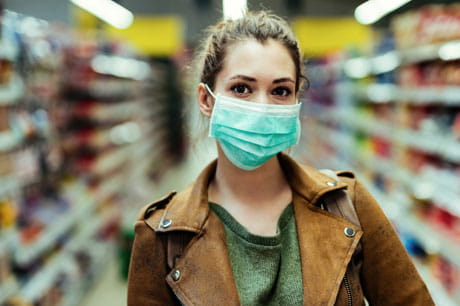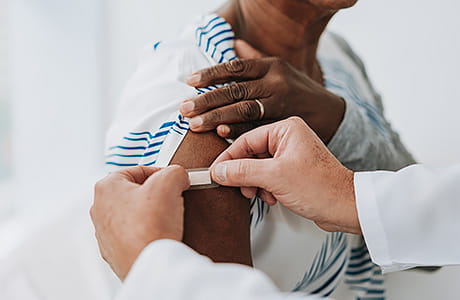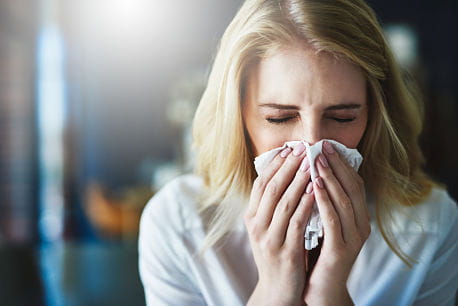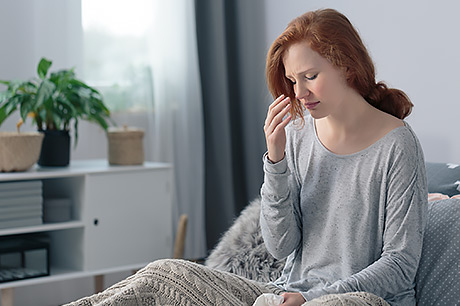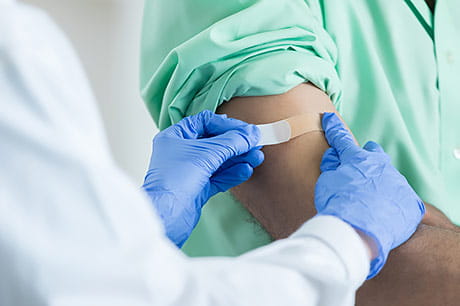Should you deliberately catch COVID-19?
While most of us are taking every precaution to avoid COVID-19, some are trying to catch the virus on purpose to “get it out of the way.”
Catching COVID (or any illness) on purpose is risky. Think it might be a good idea? Think again.
“Although omicron has been milder than other variants to date, it has not been that way in everybody,” says Dr. Stanley Martin, infectious diseases specialist at Geisinger.
Need another reason not to get COVID on purpose? How about five?
- It’s not just a cold. Although some people just have mild symptoms, others develop more severe symptoms or end up hospitalized. And even with a mild case, you’ll still need to quarantine. You’ll miss work, lose time with your family and disrupt your daily routine.
- You won’t have natural immunity. Just like with the flu, coming down with COVID-19 doesn’t mean you’re immune. You could wind up getting it again. As new variants emerge, the virus changes, which may mean a more aggressive strain. “And they can evade immunity, which decreases over time,” adds Dr. Martin.
- You might give it to others. If you come down with COVID-19, you could make other people sick, sometimes before you even know you have it. “The people you walk by might not do so well, like the elderly woman or young child at the grocery store,” Dr. Martin stresses.
- You may have a longer wait for medical care. Right now, hospitals and healthcare systems across the country are caring for more patients than normal. Because they’re overburdened with extra patients, fewer beds are available. And that means wait times are longer than usual. “You may not get the kind of care you deserve,” Dr. Martin says.
- You could develop a longer-lasting illness. Getting sick is never fun. Catching the virus on purpose may do more than just make you ill — it might give you a case of long COVID.
What is long COVID?
For most people, COVID clears up after a few days or weeks. You recover from the infection and feel better.
Sometimes, though, symptoms of COVID-19 can linger for weeks or even months after the infection clears. This is known as long COVID (or long-haul COVID).
Once the infection ends, long haulers may continue to feel ill. But there’s an unfortunate twist. “With long-haul cases, fevers and flu-like symptoms go away, but you may experience new ones,” Dr. Martin says. Symptoms of long COVID include:
- Fatigue
- Difficulty concentrating, or “brain fog”
- Loss of taste or smell
- Shortness of breath
- Joint pain
- Headaches
- Depression or anxiety
Treatment for a long-haul case of COVID-19 starts with talking to your healthcare provider. They can create a treatment plan to help you manage your symptoms so you can start feeling better.
Bettering your odds
Although you can’t control whether you get long COVID, you can lower your risk of contracting the virus in the first place by practicing healthy habits. Not sure where to start? Consider these suggestions:
- Wear a mask. Wearing a face mask protects you from inhaling droplets that travel through the air. It also keeps someone carrying a virus from getting others sick.
- Wash your hands. We often touch our face without thinking about it. Washing your hands keeps germs at bay. No sink nearby? No problem. A few squirts of hand sanitizer should do the trick.
- Quit smoking. Quitting smoking won’t reduce your risk of catching COVID-19. But because the virus can impact your lungs, nonsmokers have a lower risk of serious illness.
- Manage health conditions like diabetes. “Having several comorbidities can increase your risk of being sicker with COVID-19,” says Dr. Martin. Taking care of your health helps you reduce your risk of serious illness. And it may help you avoid long-lasting symptoms.
- Practice social distancing. When you’re out in public, like at the grocery store or pharmacy, stay 6 feet away from others. Limit how long you spend in public. And avoid gathering in large groups.
- Get vaccinated. “By getting the COVID-19 vaccine, you’re much less likely to get the infection,” Dr. Martin says. “You’re also less likely to get seriously ill or be hospitalized.” If you’ve already gotten your vaccine, be sure to get boosted.
Next steps:
Breakthrough COVID infections: Here’s what to know
Think you have COVID-19? Staying home protects everyone
Schedule your COVID-19 vaccine appointment
